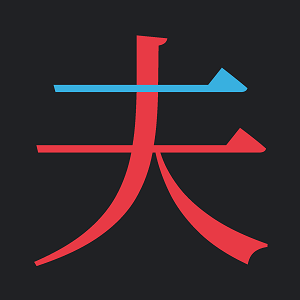夫
부수: 大
획수: 4획
夫 refers to the roles of adult men, namely tradesman and husband.

夫 = 大 + 一
X = semantic + distinguishing mark
• 大 depicts a person standing and represents the meaning ‘adult person’.
• 一 is a distinguishing mark used to differentiate 夫 from 大 and is not regarded as having any meaning. Although contrary to this, some scholars suggest the mark represents a horizontal hairpin, which is a sign that a male has reached adulthood.
Evolution:
夫 = adult male ➔ tradesman ➔ husband
Mnemonic
Imagine the distinguishing mark 一 as a hat which distinguishes a job (like a fisherman) 夫 from an ordinary man 大.
Vocabulary
| 大丈夫 | 대장부 | a manly man |
| 士大夫 | 사대부 | a nobleman |
| 凡夫 | 범부 | a mortal man |
| 農夫 | 농부 | a farmer; peasant |
| 漁夫 | 어부 | a fisherman |
| 鑛夫 | 광부 | a miner |
| 水夫 | 수부 | a sailor |
| 人夫 | 인부 | a labourer |
| 潛水夫 | 잠수부 | an underwater diver |
| 工夫 | 공부 | study |
| 夫婦 | 부부 | husband and wife; a married couple |
| 夫人 | 부인 | a(nother) man’s wife |
| 妹夫 | 매부 | the husband of one’s sister |
| 兄夫 | 형부 | the husband of one’s elder sister |
| 姑母夫 | 고모부 | the husband of one’s paternal aunt |
| 姨母夫 | 이모부 | the husband of one’s maternal aunt |
| 姦夫 | 간부 | an adulterous husband |
Additional notes
The reason why 工夫 (to study) uses 夫 has to do with following the teachings of a master, be it a tradesman or scholar.
Other resources
Image searches
Google
Bing
Yahoo Japan
Baidu (click 图片)
Sogou
Pinterest
Flickr
CJKV
CJKV Dict
Wikitionary
Unihan Database
Korean
Chinese
Written Chinese
Arch Chinese
ZDic
CC-Canto
Chinese Text Project
The Chinese University of Hong Kong (etymology)
Chinese Boost
Japanese
Takoboto
Jisho
JLearn.net
Sakura
The Kanji Map
Sentence Search
Immersion Kit
Vietnamese
Bibliography
— Daum 사전, [s.v. 夫].
— Grant, B.K. (1982). A Guide To Korean Characters: Reading and Writing Hangul and Hanja, [s.v. 78]. Seoul: Hollym.
— Outlier Dictionary of Chinese Characters, [s.v. 夫, 大, 一].
— Seely, C., Henshall, K.G., & Fan, J. (2016). The Complete Guide to Japanese Kanji: Remembering and Understanding the 2,136 Standard Japanese Characters, [s.v. 601]. Singapore: Tuttle Publishing.